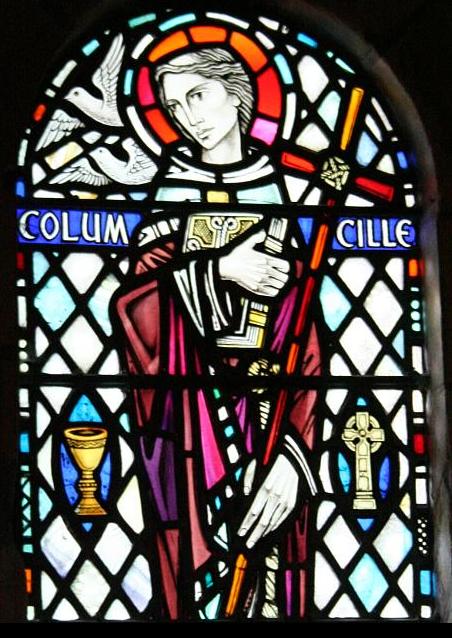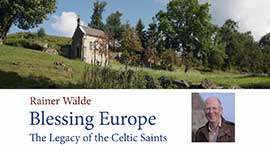BORN TODAY, COLUMBA BECAME A FAMOUS IRISH SAINT

[Above: Saint Columba, Stained glass window in Iona Abbey. [CC BY-SA 2.0] Vegansoldier / Wikimedia]
TRADITION SAYS Columba was born in Gartan, Ireland, on this day, 7 December 521. He was of a noble family. Originally he was named Criomhthan, meaning “fox” but later people called him Columba, “dove,” or Columbkille/Colmcille, “dove of the churches,” because of the gentle character he developed and his part in founding many churches. He became a monk, educator, missionary, and bishop—the founder of a monastery in Ireland and another on the Isle of Iona. Thanks to Iona’s evangelistic outreach, much of Scotland and parts of northern England became Christian.
Columba studied under St. Finnian of Moville. According to one tradition, he undertook his missionary work as penance. A violation of the right of asylum and a quarrel over a manuscript led to his participation in the battle of Cul-drebene in which many men lost their lives. Because he considered himself and his passionate outbursts partly to blame for the bloodshed, Columba traveled to Britain as “a pilgrim for Christ” to win as many souls as had been snuffed out in the battle.
Whether the battle tradition is true or not, Columba and his companions sailed in a hide-covered wicker boat to the isle of Iona off the coast of Britain. From that strategic location they preached the gospel to Picts. Either the Picts gave him the island in appreciation for his efforts to bring them the gospel, or a royal relative presented it to him; accounts differ.
Adamnan’s account, our main source of Columba’s life, credits him with many miracles and prophecies. According to Adamnan, Columba turned water into wine, calmed a storm, drove out demons, raised a dead man to life, and provided a miraculous catch of fish just like Jesus. Like Moses, he drew water from a rock. He even confronted and drove off a monster in the river that flows out of Loch Ness. Adamnan described many other miracles and claimed contemporaries saw Columba surrounded by divine light.
Ever practical, Columba encouraged his followers to study and learn Scripture; and he set them an example of simple, austere living, as well as humility:
But how earnestly this soldier of Christ endeavored to cultivate the graces of humility and love, what pen can adequately tell, for bearing constantly in mind the precept of his master in which it is said, “he that would be chief among you, let him be your servant,” he used to unloose the shoes from off the feet of his disciples, and wash their feet after their work in warm water, attending upon them like an humble slave.
Columba died on the Isle of Iona, probably in 596, having predicted the day of his own death. Historical documents show that he had significant influence on peace treaties implemented in his own day, rightly earning himself the name “Dove.”
—Dan Graves
----------------------------
For more on the role of the Irish in converting Europe, watch Blessing Europe: Legacy of the Celtic Saints at RedeemTV
Blessing Europe - Legacy of the Celtic Saints can be purchased at Vision Video







